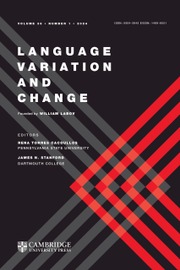Article contents
The case for politeness: Pronoun variation in co-ordinate NPs in object position in English
Published online by Cambridge University Press: 25 November 2003
Abstract
The use of the nominative 1sg pronouns in co-ordinate NPs in object position, most famously between you and I, has received much attention from prescriptivists and formal linguists, but it has never been the object of a variationist study that compares its usage to that of other variants. This article seeks to fill the gap, based on a data set of co-ordinate NPs in object position, gathered through observation of everyday speech as well as in experimental sociolinguistic interviews. Arguing that the choice of NP case and of NP order is inseparably related, we identify three major patterns of co-ordinate NPs: Vernacular me and X and two post-Vernacular patterns, Standard X and me and Polite X and I. We then examine social and linguistic factors that constrain the usage of individual patterns. We conclude that all three patterns are robust and that they exist in stable ternary variation.This article, which we authored jointly, arose from a paper we presented with Cecilia Cutler and Keith Fernandes at NWAVE–XXVII in Athens, Georgia. Cece and Keith worked with us in gathering the data and participated in extensive discussion with us concerning the phenomenon under study. We are grateful to them. The NWAVE paper itself grew out of a project in a linguistic variation class at NYU. The other participants in the class project were Tiffany Dugan and Agnieszka Rakowicz, and we thank them for their help. We benefited from discussions with Arto Anttila, Jeff Parrott, and Sharon Klein and from audiences at NYU and Stanford. E. W. Gilman called our attention to several relevant articles, and Maryam Bakht-Rofheart, Erik Falkensteen, Bill Haddican, and Ken Lacy provided us with relevant examples from the media. We also thank Sandra Singler Harding, Tom Leu, Erez Levon, Pat Reilly, and Arnold Zwicky. The quotation from an Episcopal missionary appears courtesy of The Archives of the Episcopal Church USA. We thank Jennifer Peters, archivist, and her staff for their assistance.
- Type
- Research Article
- Information
- Copyright
- © 2003 Cambridge University Press
References
REFERENCES
- 12
- Cited by


